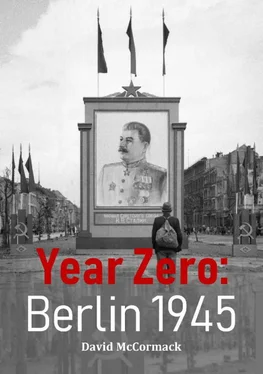I was sure that Stalin had no idea of the significance of what he was being told… If he had had the slightest idea of the revolution in world affairs which was in progress his reactions would have been obvious. Nothing would have been easier for him to say, “Thank you so much for telling me about your new bomb. I of course have no technical knowledge. May I send my expert in these nuclear sciences to see your expert tomorrow morning?” But his face remained gay and genial and the talk between these two potentates soon came to an end. As we were waiting for our cars I found myself near Truman. “How did it go?’ I asked. “He never asked a question”, he replied.
Both Churchill and Truman had completely underestimated Stalin. His apparent indifference was nothing but a ploy. Thanks to his spy network, he knew considerably more about the Manhattan Project than the American President. Later that evening, Stalin conferred with Molotov about Truman’s disclosure. Molotov reacted decisively by saying, ‘We’ll have to talk it over with Kurchatov and get him to speed things up’. Later, the actual deployment of nuclear weapons against Japan served to further accelerate the Soviet research programme. The nuclear arms race was now under way. The Cold War had begun in earnest, Berlin would be its focal point in Europe.
After Potsdam, the Grand-Alliance disintegrated as relations between the former comrades-in-arms soured. There was little if any common ground with which to form a basis of mutual understanding. Indeed, Stalin’s policy of ‘tenacity and steadfastness’ contributed greatly to the vortex of mistrust that was destroying any hopes of future cooperation between the occupying powers. The role of nuclear weapons in this process was ‘subtle, but not unimportant’. Stalin once remarked that, ‘Atomic bombs are meant to frighten those with weak nerves’. By remaining steadfast, he appeared strong. In reality this amounted to a resounding ‘Nyet’ to every proposal put forward by the Americans and British. In Berlin, this meant the end of any active cooperation between the occupying powers.
Chapter Sixteen
Orderly and Humane?
Stalin was determined to alter the Polish political landscape to his satisfaction. Never again would Poland serve as a staging-post for a German invasion of the Soviet Union. Polish lands would now provide a buffer zone against future incursions by the forces of capitalism. To create this buffer zone, the German population in those areas of eastern Germany ceded to Poland would be forcibly expelled. After much discussion, the new Polish border had been finally ratified at Potsdam. The new German-Polish border would now run along the Oder-Neisse line. Millions of Germans living in those areas east of the newly agreed territorial zone faced an uncertain future. The Polish population was on the move too, as those populating the areas ceded to Stalin under the Ribbentrop-Molotov Pact of August 1939 were forced westwards. This reordering of populations inevitably raised concerns with the Allies. Truman later recalled how Stalin responded to concerns about the border issue:
I remember at Potsdam, we got to discussing a matter in eastern Poland, and it was remarked by the Prime Minister of Great Britain that the Pope would not be happy over the arrangements for that Catholic end of Poland. The Generalissimo leaned on the table, and he pulled his moustache like that, and looked over to Mr Churchill, and said, ‘how many divisions does the Pope have?’
The protocols developed during the Potsdam Conference had requested the suspension of population transfers until the Allied Control Council could guarantee that they were carried out in an ‘orderly and humane manner’. However, Stalin’s intransigence and impatience meant that the removal of the German population from what was now Polish-Soviet administered territory east of the Oder was anything but orderly and humane.
The displacement of Germans from East Prussia, Pomerania and Silesia was much on the mind of Washington’s new ambassador Arthur Bliss Lane when he took up his post in Warsaw. In August 1945, Soviet representatives on the Allied Control Council estimated that some five and a half million Germans had already been expelled. Part of Lane’s brief was to attempt to bring some order to the chaos reigning in Poland. The Polish Vice Minister for Foreign Affairs Zygmunt Modzelewski claimed that his government had no wish to add to the apparent chaos, but indicated that the expulsions in Stettin, Oppeln, and Silesia would continue. In a letter to the State Department in Washington, Lane outlined his impressions of the Poles feelings towards the Germans, stating that, ‘The hatred against the Germans is great – as can be readily understood after seeing Warsaw as it is now’.
On 18 September, Lane met with the political advisor Robert Murphy in Berlin. The ‘unnecessary harshness’ of the Poles was to be regretted. However, it was agreed that any open criticism would be counterproductive as it would be adversely reported on in the Polish state-controlled press. On 12 October, Murphy put into writing his concerns regarding the movement of people in a letter to the Office of European Affairs. In it he wrote:
I am uncomfortable in the thought that somehow in the future we may be severely blamed for consenting to be party to an operation which we cannot ourselves control and which has caused and is causing such large scale human suffering.
Murphy’s concern was not so much about the plight of the German people, but the failure of his administration in standing up for the very principles which had brought America into the war.
Notwithstanding Murphy’s concerns, the trains continued to roll westwards, carrying with them their human cargo of misery consisting of ‘blind mutilated soldiers, homeless boys, starving verminous mothers, infants’. Hardly a day went by without Red Cross workers having to remove dozens of corpses from the overcrowded and freezing trains. For Murphy, the scenes at Berlin’s train stations represented, ‘retribution on a grand scale, but practised not on the Nazi activists, but on women and children, the poor, the infirm’. Just like the trains before them which had rolled eastwards towards the ghettos and death camps, these trains too took as long as a week to cover distances which in peacetime would have taken less than a day. For those that survived the harsh deportation process and the journey, there were further dangers in store as they were easy pray for thieves in a city which had become lawless. The authorities in the American sector where most of the trains arrived wrung their hands, but did nothing, Berlin was becoming a city of refugees.
The numbers were staggering, during the summer of 1945, some 550,000 Germans from the eastern territories were dumped in Berlin, many of them without any other possessions than the clothes on their backs. That summer, a trainload of deportees from Pomerania arrived in the capital. Of the 300 children forced onto the train, half were dead when the train finally pulled into Berlin. There were also several hundred hospital patients on board, all whom had been brutally ejected from their beds without any consideration for their individual medical conditions. Another transport, this time carrying Sudeten Germans from Troppau arrived in Berlin after a hellish eighteen day journey. Of the 4,250 women, children and old men on board, only 1,350 survived.
The tragic scenes being played out were witnessed by Lieutenant-Colonel Byford Jones who served on Montgomery’s Berlin staff. His reports elicited some sympathy in Britain, particularly with some sections of the press. In a published personal account entitled Berlin Twilight he wrote:
In the course of two or three months, I made periodic visits to various railway stations… Everywhere I found men and women who had lost, together with their homes, families and property, all human dignity, and had become animals, sleeping like animals on the floor… They looked like tramps who had spent a lifetime on the road. When I saw their passport photos, taken a few months before, I was staggered. The change these people had undergone was incredible. They had all lost weight, aged ten years, had lined faces. They were sick and mentally unbalanced… I went around some of the refugee camps – former barracks, schools, quarantine stations, Red Cross centres – which were like a crown of thorns around the festering head of Berlin – and I saw such human degradation, depravity and tragedy that I was physically sick after a few hours of it.
Читать дальше












